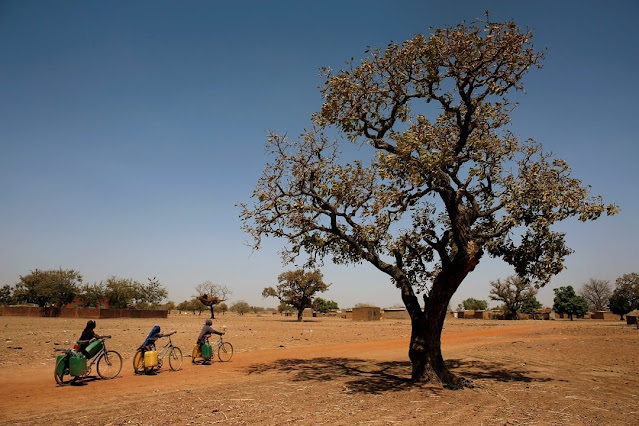Period Poverty
What is period poverty?
Period poverty is the lack of access to sanitary products due to financial constraints, also commonly referred to as menstrual health management (MHM). Improving access to menstrual hygiene products (MHP) contributes to the achievement SDG 5 "to achieve gender equality and empower all women and girls." However, due to inadequate water, sanitation and hygiene facilities (WaSH) in Africa, most women are unable to properly maintain their menstruation needs sufficiently. Most girls rely on close friends and families as their source of information about menstruation and sanitation, rather than a professional health worker. Periods are heavily stigmatised and are associated with shame and taboo in many African societies due to common misinformation on the topic.
Shame and sickness
Access to safe and hygienic sanitation products is a serious concern for women and girls in Africa, particularly for those from disadvantaged socio-economic backgrounds. For most women, menstruation is their most stressful sanitation-related activity. For example, 87% of girls in rural western Uganda use old clothes or rags as menstrual absorbents. The materials used are rarely washed with soap and clean water due to their lack of access to WaSH facilities. Inadequate and unsafe cleaning of sanitary products is associated with infections. Many girls from low socio-economic backgrounds use absorbent materials that are dangerous or are used in ways that are unsanitary, making them susceptible to health risks. This often leads to symptoms such as vaginal pain, bruising and reproductive tract infections.
Period poverty and girls' education
The feelings of shame and indignity associated with periods affect girls' confidence in school, consequently impacting their participation. Additionally, the discomfort of their menstruation itself can be largely distracting. The low level of priority given to MHM correlates to girls' poorer educational attainment and higher drop-out rates as well as affecting women's economic (in)activity. Most toilets do not provide sanitary waste disposal bins, which is problematic for women who need to safely and discreetly dispose of their MHP to avoid the shame that comes with visible MHP. Furthermore, toilets and latrines are poorly maintained and unsafe for women and girls, especially in informal settlements, and do not provide adequate privacy, often leaving women vulnerable to the male gaze. A study of Ethiopian school girls found that 85% of girls did not change their absorbent material at school, and 77% disposed of their materials in latrines or open fields.
 |
| WomenChoice Industry receive $200,000 funding for Menstrual Health Management in Tanzania, 2020 |
MHM was the centre of an initiative aimed at empowering adolescent girls in school. This project comprised of both hardware and software interventions. Hardware interventions include supplying MHP and improving WaSH and disposal facilities, whereas software interventions revolve around educating and raising awareness on MHM. Prior to this intervention, water and sanitation in schools were highly inadequate because water sources were located far away and latrines were unmaintained and in unsafe conditions. The project refurbished old latrines and built new ones to ensure the longevity of WaSH facilities for future use. The project also commemorates Menstrual Hygiene Day to raise awareness and gain support for MHM. Due to the success of this project, many districts in Tanzania are increasingly investing in funding for MHM and WaSH facilities as well as creating minimum MHM/WaSH standards.
These factors and issues that girls face when menstruating, alongside many others, which I will not discuss in this blog, often leads to absence from school. In South Africa, a study states that girls miss up to five days of school a month during menstruation. There is a multitude of research that demonstrates the direct correlation between school attendance and education attainment and the correlation between educational attainment and future economic activity. Girls miss school due to inadequate WaSH facilities and improper MHM - this coupled with the cultural norm of female duty and responsibility to collect water, which will be explored in the next blog entry, highlights the extent to which girls and women are disproportionately disadvantaged by the water crisis in Africa.

This is a very timely topic. It is interesting to see the huge impact that menstruation has on girls and women in their lives. Some countries like Kenya have removed their tax on some sanitary products- what impact do you think this could make on the accessibility of sanitary products for girls? Great blog post and looking forward to reading more :)
ReplyDeleteI think this is an excellent way forward for Keyna and its girls and women, certainly more progressive than most Western states who still impose tampon tax etc. Accessibility and affordability have always been a struggle for girls and women from poorer households, hopefully removing taxes will mean more accessible sanitary products, reduced health risks from inadequate MHP and potentially even the destigmatisation of periods.
DeleteA good attempt at teasing our the complex intersection of water, sanitations, gender inequality and period poverty. I was wondering how the challenge of period poverty fits within the objectives of SDG 5 and 6, also how does the issue of period poverty impact women in suburban and urban environments.
ReplyDeleteHi Clement! The fact that period poverty is the reality for countless number of girls and women in Africa (and S.E. Asia) means that we are nowhere near achieving SDG 5 (gender equality) and SDG 6 (sustainable water and sanitation management). By eradicating period poverty, the international community will be a massive step closer to achieving these goals. And the issue of period poverty impacts urban and suburban women in very similar ways to rural women. Poverty in rural areas are much higher, which is why I focus largely on rural areas in this blog. However, urban women also have inadequate access to bins, clean and safe toilets and affordable sanitary products.
Delete